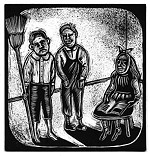Crossing Cultures
By Ada Calhoun, Fri., Jan. 12, 2001
ALTA is unique because it crosses borders, in Schulte's words, "between independent and academic translators." ALTA has certain strategies to keep out what Schulte calls "academic boredom." For example, nobody is allowed to read papers at ALTA's annual conference. ALTA's "professional and warm atmosphere" also wards off the "prima donna attitude" of, say, the Modern Language Association (MLA).
"All communication is translation," Schulte says, as have many others before him. In one of his essays, Octavio Paz says that when a child asks his mother what a word means the mother has to translate it into the language of the child. This process continues throughout our lives, as we must translate new ideas into the sensibility of our present environment. In writing for other people, we must likewise translate ourselves for them, just as a performer might "read" his audience before choosing a strategy to get across whatever message must be conveyed.
"You can detect the most delicate changes in culture most conspicuously in changes in language," Schulte says. Differences between cultures are also, according to Schulte, evident in the way they use language. "Take the word 'run' -- to run a bank," he says. "You can't say that in German. And in English the motor runs, in French the motor walks." In taking one language into another, one thus encounters an infinity of problems. For example, in German the term "the blue flower" is a symbol of romanticism, capable of conjuring up great sentimentality. The literal English equivalent has no such power. At the same time, translation can revitalize language, because knowledge of etymology and the unique power of each word makes the translator deeply conscious of language's mutability and grace. When one looks as closely at language as the translator does, "certain words begin to take on new energy."








